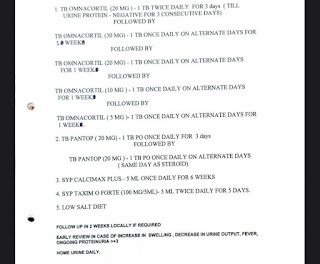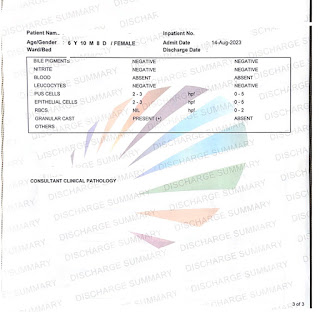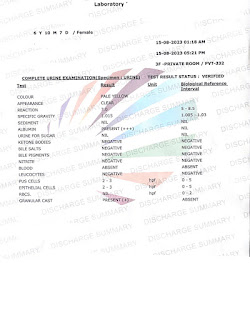Case of a 6 years old girl with nephrotic syndrome.
This is an online e log book to discuss our patient's de-identified health data shared after taking his/her/guardians' signed informed consent. This Elog reflects my patient-centred online learning portfolio.
This is the case of a 6 years old girl, who is a resident of Bidar, Karnataka.
CHIEF COMPLAINT
According to the patient's parents, the patient has the chief complaints of episodes of UTI with fever, which is followed by decreased urination , puffiness of the face and the development of a pot belly.
HISTORY OF PRESENTING ILLNESS
The patient was apparently asymptomatic 3 years ago, when the patient was 3.5 years old, she developed severe diarrhea. She would pass loose stools every 1-2 mins. The stools contained mucus and did not contain blood. She was admitted to a hospital in Bangalore. During the routine tests, the patient was found to have protein loss in the urine. Since the protein loss was not severe , further evaluation was not done and the patient was discharged, after receiving treatment for diarrhea.
1 month later, the patient developed puffiness of the face and a pot belly( complained of tightness in the abdomen ), with a mild increase in weight. She was taken to a hospital. Tests revealed that she had increased protein loss in the urine. She was given steroids and diuretics, following which the patient recovered. She was diagnosed with nephrotic syndrome.
From then the patient has had an episode every 4-5 months (She has had around 4-5 episodes till now). Each episode would usually have a similar pattern, which would be a UTI or diarrhea, with fever (102-103 degrees Fahrenheit) and vomiting (non-bilous vomitus containing the food she would consume half an hour ago, ), followed by symptoms associated with fluid retention in the body like decreased urination ( 2-3 times a days, with dark concentrated urine in the morning) , puffiness of the face (noticed first), and development of a pot belly (usually seen after 2-3 days of the UTI). She is taken to the hospital as soon as the puffiness of the face is noticed. There is no change in the physical appearance of the urine. She is given steroids every time. Her symptoms would usually last for 2-3 days and recede after taking the medication.
15 days ago, the patient complained of a mild burning sensation during micturition, (not associated with fever or any change in the physical appearance of the urine or blood) after which, she developed decreased urination, puffiness of the face, and a pot belly (she complained of pain in the abdomen due to tightness in the abdomen). She was taken to the hospital. Oral medication did not provide any relief, hence she was given IV loop diuretics, following which she got relief. The patient was prescribed oral steroids and is currently taking them.
HISTORY OF PAST ILLNESS
In 2018 the patient complained of severe pain in the abdomen and vomiting. She was taken to the hospital. It was diagnosed to be a stomach infection.
In 2020 , the patient would get frequent indigestion and vomiting after eating food.
Not a known case
of DM, hypertension, asthma, TB, Thyroid condition, CVD, or Epilepsy.
FAMILY HISTORY
MOTHER- During pregnancy, she had bleeding PV following conception, which lasted for nearly 5 months . She was given an injection weekly for 5 months. After 5 months, she developed a UTI, and she complained of pain in the pelvic area , that would be present before and after urination . She underwent a caesarian section , due to passing of meconium by the foetus while still in the uterus. The umbilical cord was found around the neck of the foetus , after delivery.
FATHER - Known case of DM.
GRANDMOTHER - Recurrent UTI. Was detected with Renal TB. Underwent nephrectomy.
AUNT- Known case of a thyroid condition.
PERSONAL HISTORY
The patient has a few strands of grey hair at the centre of the scalp.
DIET- Mixed. Has not been consuming non-veg food from 1 year.
APPETITE- Normal
SLEEP- Adequate
BOWEL
AND BLADDER MOVEMENTS -Constipation from 6 months. Passes hard stools ( difficulty in passing stools) every alternate day. Not associated with any change in the appearance of the stools.
Bladder movements - Normal, except for decreased urination during episodes.
ALLERGIES- Immediately gets diarrhea after consumption of egg.
CURRENT MEDICATION
The patient has been consuming the following medicines from 10 days.
DISCHARGE SUMMARY
16/8/23
INVESTIGATIONS
April 2018
May 2018
June 2020
July 2020
September 2020
June 2021
July 2021
February 2022
October 2022














































Comments
Post a Comment